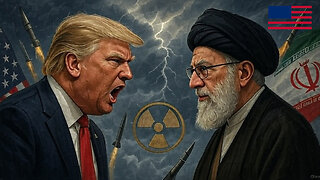Premium Only Content

RT News - December 6th 2022
In Donetsk, four more civilians have been killed and three injured by Ukraine attacks on Donetsk city. The strikes were made with US supplied weapons.
As the EU appears to be fast-tracking Ukraine into it's fold, there's a bid to shore up waning influence in the Balkans; the EU holds its first-ever regional summit in Tirana amid dwindling interest among former Yugoslav states towards joining the European bloc.
Burkina Faso has banned another French media radio station. The citizens just don't want them there. Please refer back to the past posts on this channel to catch up on Burkina Faso. (QS Wish we could ban our lot 👀 )
Ukraine drone strikes on the Kursk region of western Russia have hit an oil storage facility. In the Saratov and Ryazan regions, drone strikes killed three service personnel and injured four more on Monday. All of these regions are well away from the Ukraine border.
Warning, sensitive images: Western-supplied weapons are found as RT gets exclusive access to Ukrainian positions recently taken over by Russian troops.
Dmitry Kozatsky, a Ukrainian "militant" with the notorious neo-Nazi Azov regiment, has been meeting celebrities in the USA on his tour. More worrying, he is said to have visited the US State Department. (3 below)
The South African parliament rules to postpone a long-awaited vote on President Ramaphosa's impeachment by this week as the scandal continues to divide the nation.
Kenya's largest ethnic group fights for its heritage, with leaders calling for Britain to return artefacts taken from the country decades ago.
In Uganda, monitoring a lady's pregnancy has just become a lot easier and more convenient. The device designed by a Ugandan engineer also makes life easier for the nurses and doctors who would normally monitor the pregnancy at the hospital.
In Indonesia, a volcano has erupted causing 2000 people to be evacuated.
NATO: Turkiye wants more concessions before approving Sweden's accession, especially in the light of last month's terrorist attack.
=================================
below
1) ------ Drone targets another Russian airfield – governor
2) Ivan Timofeev: What does the West's 'oil price cap' mean for Russia and how will Moscow respond?
3) Spanish college drops exhibition by Ukrainian Azov fighter
==================================
via RT website 6 Dec, 2022 05:03
1) ------ Drone targets another Russian airfield – governor
A fuel tank caught fire following an attack in Kursk Region, which borders Ukraine
An airfield in the city of Kursk has been targeted in a drone attack, according to the governor of the southwestern Russian border region. The strike comes just one day after two Russian airbases in Ryazan and Saratov Regions far from the border were targeted with similar weapons.
“As a result of a drone attack, an oil storage tank caught fire in the area of the Kursk airfield. The fire is being localized. All emergency agencies are on site,” Kursk Region Governor Roman Starovoyt said in a Telegram post on Tuesday morning around 7:20am local time.
There were no casualties, according to preliminary information shared by the governor.
On Monday, a number of “Soviet-made” jet drones flying at low altitude targeted long-range strategic aviation assets at the Dyagilevo airfield in Ryazan Region and Engels airfield in Saratov Region, according to the Russian Defense Ministry.
The military said the unmanned vehicles were detected and shot down by air defenses, but noted that debris impacted the airfields, “slightly” damaging two aircraft. Three service members were “fatally injured,” while four more were taken to military hospitals for treatment.
https://www.rt.com/russia/567735-kursk-airfield-drone-strike/
====================================
via RT website 5 Dec, 2022 10:35
2) Ivan Timofeev: What does the West's 'oil price cap' mean for Russia and how will Moscow respond?
After months of back and forth, the scheme finally begins as questions remain about how it will work in practice
By Ivan Timofeev, Valdai Club Programme Director & one of Russia’s leading foreign policy experts.
Monday is D-Day for the West's attempt to place a price cap on Russian oil exports. In building up pressure on Moscow, the US and its allies will use their considerable experience of restrictions against Iran. Tehran continues to survive under the sanctions, although it has suffered losses. There is no doubt that Russia will also retain efficient ways to supply its oil to foreign markets. However, as in the case of Iran, the sanctions will increase the cost of those exports.
A price threshold for Russian oil had been discussed for several months. The idea was announced back in early September in a statement by the G7 finance ministers. Its essence was to prohibit the transportation of Russian oil and oil products by sea when the contract price exceeds a predetermined price level. Along with transportation, there are related services, such as insurance, financing, and brokerage services. A ‘price threshold coalition’ was formed, which, along with the members of the G7, included Australia and the EU member states.
Washington, London, and Brussels have already developed legal mechanisms for the new restrictions. On Monday, they come into force, and, in February, they are expected to be applied to oil products. The initiators of the sanctions expect attempts to circumvent them and have been trying to close possible loopholes in advance. What kind of workarounds do Western countries expect, and what are the chances they’ll be able to impose a price cap on other states?
The price threshold for oil is a relatively new, and non-standard, type of sanction. The most common sort of embargo is restrictions on exports and imports, as well as blocking sanctions. The latter entails a ban on any financial transactions with individuals or organizations designated as a blocked person. The Russian oil industry has already faced a wide range of export and import restrictions. The US, EU, UK and a number of other countries have introduced or are gradually introducing bans on the supply of oil and petroleum products from Russia. They have largely blocked the supply of equipment for the domestic energy sector. Even before the Ukraine conflict, a number of large Russian oil companies were subject to sectoral restrictions in the form of a ban on long-term lending and a block on deliveries for individual projects. It turned out to be more difficult to impose the latter type. A number of top managers and major shareholders of Russian oil assets were included in the lists of blocked persons. However, the West did not dare to fence off the companies themselves – Russia is too large a supplier of oil to the world market. Banning the financial transactions of Russian suppliers would lead to a panic in the market and an astronomical rise in prices. Thus, it is the collateral damage that has been the only thing stopping the West from blocking Russian oil companies.
A price cap was proposed as a softer measure. The US and its partners are betting on the fact that Western companies control significant volumes of transportation and insurance. They are also gambling on the dominance of the US dollar in global financial markets. Russian producers are being driven towards a situation in which they will either have to sell oil within the price threshold, or it will simply not be delivered. In addition, such cargo will not be insured, and financial transactions involving banks from the ‘threshold coalition’ will become impossible. Moscow has already threatened to stop supplies to those countries that go ahead and implement the decisions of the ‘coalition’. But these countries have largely given up on Russian oil anyway. India, China, and other friendly states may not join in, but Western carriers won’t deliver Russian crude to them.
The initiators of the sanctions expect a number of schemes to be attempted to circumvent the new measures. The first is the formal observance of the price threshold, but manipulations with the price of transportation or other related services. The US Treasury is warning carriers, insurers, bankers and other market participants in advance that commercially unreasonable rates will be considered a sign that the price cap regime is being violated. The concept of commercial justification has not been disclosed, but the signal has been sent.
Another possible circumvention option is the distortion of documentation, which can take place both on the supplier’s side and be the result of collusion between the supplier and the carrier. In this case, carriers are told to keep all the documentation from transactions for five years, and providers of insurance and other services must have a clause in contracts that the oil being transported is below the price threshold. Such archives themselves do not insure against violation, but this does allow a suspicious regulator to quickly check the history of transactions. Companies can get off relatively lightly for unintentional violations, but deliberate circumvention is fraught with criminal prosecution. Another way around is to mix Russian oil with oil of different origin. So far, clear criteria for such proportions have not been defined, although the US Treasury is calling for caution in such transactions. In determining this parameter, the EU may take into account the clarifications of the European Commission on mixtures subject to import restrictions.
The experience of US law enforcement practice shows that there will be violations of the sanctions regime, and American regulators have developed mechanisms for detecting them. The EU and UK have less experience, although this does not rule out that violators will be actively prosecuted. However, the indicated methods of circumvention still seem to be some form of ‘monkey business’ that will not systematically solve the problem for Russia. In Moscow, much more ambitious steps can be developed.
The most obvious measure is to build up Russia’s own tanker fleet. Reports of such steps have appeared in the international media, although reliable estimates are difficult to make. Moreover, the US, EU, and other collaborators still have the means counteract this. They can simply add Russian oil tankers to the lists of blocked ships. This would significantly hamper their ability to be serviced in foreign ports. Secondary American sanctions and fines are feared even in friendly countries. The secondary US measures being used against the Chinese COSCO Shipping Tanker and some other companies for the alleged transportation of Iranian oil in 2019 can serve as a warning. The EU has also provided for a mechanism to punish ships carrying Russian oil above the price ceiling. Ships in violation of the mechanism will be denied financial, insurance, and other services in the EU jurisdiction. The wording of paragraph 7 of Article 3n of EU Council Regulation No 833/2014 suggests that the measure pertains to any ship, regardless of the country of origin.
Similar problems may also arise when a Russian insurance company is set up to serve bulk oil shipments, or if a company from a friendly country is involved. Here, the US and its allies also have the instrument of secondary sanctions in their hands. The same goes for financial transactions. Operations in the currencies of the initiating states will be blocked. Here again the question of settlements in national currencies comes to the fore. The big question is whether banks in friendly countries will run the risk of the same secondary sanctions for transactions above the price threshold. The legal mechanisms for such penalties have not yet been spelled out. However, they may appear at any moment, or the initiating countries, primarily the US, may provide an explanation of how existing norms may be applied to the price threshold. This happened recently with explanations of possible sanctions for using the Mir payment system in the interests of blocked persons.
The bottom line is that the ‘threshold coalition’ does not have to seek the entry of more countries into its ranks. It is enough to threaten others with secondary sanctions or coercive measures for violations, or simply block insurance services or financial transactions passing through Western insurance companies and banks in violation of the prescribed norms.
In building up pressure on Moscow, the US and its allies will use their considerable experience of restrictions against Iran. Tehran continues to survive under the sanctions, although it has suffered losses. There is no doubt that Russia will also retain efficient ways to supply its oil to foreign markets. However, as in the case of Iran, the sanctions will increase the cost of those exports.
https://www.rt.com/news/567681-wests-oil-price-cap/
======================
via RT website 13 Nov, 2022 19:59
3) ----- Spanish college scraps exhibition of photos by Ukrainian Azov fighter
The Polytechnic University of Catalonia said it learned that photographer attached to the notorious unit was a neo-Nazi
The Polytechnic University of Catalonia (UPC) has scrapped a photo exhibition by Dmitry Kozatsky, a Ukrainian militant with the notorious neo-Nazi Azov regiment. The exhibition ran at a university’s library since October 18 until Sunday, when it was abruptly removed.
The University said it opted to cancel the exhibition after it was alerted about Kozatsky, who is also known under his military call sign ‘Orest’, and about his neo-Nazi views.
“Regarding the information revealed about the author of the exhibition at the Ferraté Library, we inform that the artwork has been removed and that the University wasn’t aware of the ideology of the author. The UPC radically rejects Nazism and regrets the situation created,” the University said in a statement.
The photos displayed at the exhibition were taken by the fighter during the Azovstal siege earlier this year, with the militant ultimately ending up in Russian custody. Orest was released from captivity during a prisoner swap between Kiev and Moscow later into the conflict.
It was not immediately clear how exactly the University managed to miss Orest’s views, given he never actually concealed them and proudly displayed assorted hate symbols on social media. The downfall of the exhibition happened only when Anatoly Shariy, a popular Ukrainian opposition blogger and a vocal critic of the Kiev government, who is currently residing in Spain, became aware of the event earlier in the day.
Shariy claimed he had contacted “several influential journalists” in the country, stating on social media that the University “will remember this exhibition for a long time.” Apart from that, the blogger encouraged his followers to spam the University with screenshots of Orest’s now-deleted posts, where he displayed assorted neo-Nazi hate symbols.
Shariy predicted the spam attack will be countered by “dumb Nazis,” trying to dismiss the offensive imagery as “Russian propaganda.” Indeed, a handful of pro-Ukrainian users have shown up on the University’s social media feeds, claiming the screenshots were doctored and accusing it of supporting Moscow with the cancellation of Kozatsky’s photo exhibition over his views.
The offensive posts by Orest included the fighter showing off a pizza he baked with a ketchup swastika topping. Apart from that, Orest posted a mirror shot of himself sporting a black hoodie with Ukrainian coat of arms and ‘14/88’ written on it. The numerical coding is widely regarded as a hate symbol and is extremely popular amongst assorted neo-Nazi groups.
The code is a reference to racist concepts originating with the late US white supremacist and convicted domestic terrorist David Lane, namely his Fourteen Words and the 88 Precepts. On its own, ‘88’ is considered to be a reference to the ‘Heil Hitler” salute, as ‘H’ is the 8th letter of the alphabet.
https://www.rt.com/news/566446-spain-azov-exhibition-scrapped/
===================================
-
 LIVE
LIVE
Major League Fishing
2 days agoLIVE Tackle Warehouse Invitationals, Stop 5, Day 1
340 watching -
 1:58:27
1:58:27
The Charlie Kirk Show
2 hours agoTwo-Week Test + AMA | Sean Davis | 6.20.25
28.9K14 -
 LIVE
LIVE
GritsGG
1 hour agoWSOW Qualifiers! 👑 2587+ Ws
55 watching -
 2:02:53
2:02:53
Tim Pool
3 hours agoU.S. Says NUKING IRAN Is The Only Option, Should The US Intervene? | The Culture War with Tim Pool
186K148 -
 LIVE
LIVE
The Dilley Show
2 hours ago $8.21 earnedMAGA Mayhem Recap, USAID Bribes? and Q&A Friday! w/Author Brenden Dilley 06/20/2025
2,146 watching -

The Big Mig™
1 hour agoGlobal Finance Forum From Bullion To Borders We Cover It All
4.04K7 -
 1:02:44
1:02:44
Flyover Conservatives
13 hours agoThe Conservative Civil War: Tucker vs Cruz, Who’s Right? | FOC Show
22.7K8 -
 LIVE
LIVE
Side Scrollers Podcast
3 hours agoCONTENT NUKE GOES LEGAL, AI To REMAKE Classic Movies, Walter Day Interview | Side Scrollers Live
310 watching -
 LIVE
LIVE
Viss
2 hours ago🔴LIVE - How To Dominate Solos in PUBG!
162 watching -
 16:30
16:30
Clownfish TV
9 hours agoBluesky BANNED J.D. Vance After Only 12 MINUTES?!
3.75K14